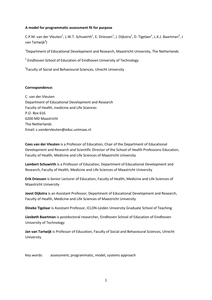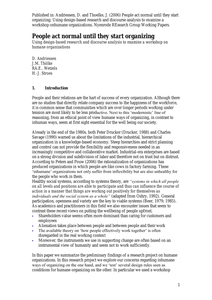Emergence, the coming-into-being of new entities, new organizations, or new structures out of the interactions of individual agents in networks, is becoming a central concept in today's management literature. We are now evolving from the age of reductionism to the age of emergence, meaning that organizations in the connected society can no longer predict what is going to happen but will find themselves continuously doing things (creating value) in co-evolution with their environment, things that are not necessarily in line with actions planned in advance. In such a dynamic environment managers must learn to enable emergent processes in real time if an organization is to turn unpredictability to its competitive advantage. The importance of the perspective of emergence is introduced in regard to the growing complexity in society.
LINK
In May 2007, our Centre for Research in Intellectual Capital hosted the International Congress on Intellectual Capital: The future of business navigation. The Congress – which took place in Haarlem, The Netherlands – was attended by more than 140 participants from 23 countries. Based on almost 70 papers, we designed a conference program that consisted of more than 90 sessions. This special issue is based on a selection of the best papers of our conference.
DOCUMENT

A model for programmatic assessment in action is proposed that optimizes assessment for learning as well as decision making on learner progress. It is based on a set of assessment principles that are interpreted from empirical research. The model specifies cycles of training, assessment and learner support activities that are completed by intermediate and final moments of evaluation on aggregated data-points. Essential is that individual data-points are maximized for their learning and feedback value, whereas high stake decisions are based on the aggregation of many data-points. Expert judgment plays an important role in the program. Fundamental is the notion of sampling and bias reduction for dealing with subjectivity. Bias reduction is sought in procedural assessment strategies that are derived from qualitative research criteria. A number of challenges and opportunities are discussed around the proposed model. One of the virtues would be to move beyond the dominating psychometric discourse around individual instruments towards a systems approach of assessment design based on empirically grounded theory.
MULTIFILE

Introduction (author supplied) : In this paper we propose future mapping, an alternative approach to futures research. With future mapping we intend to overcome some of the main problems that we encountered when applying scenario thinking in the area of product design and innovation. Future mapping attempts to develop multi-layered maps of possible futures, which can be used by pro-active companies and innovation teams as an instrument to ‘navigate’ the future (Munnecke & Van der Lugt, 2006). The approach invites designers to apply their analytical, creative and emphatical skills in a dialogue about future opportunities that lay ahead. In the past few years we have taught and applied the future mapping approach with various groups of Master’s level engineering students, both in The Netherlands and Denmark. We have altered and adjusted the approach as we learned from these experiences. In this paper we will describe the current state of the approach. The paper is not meant to provide a deep theoretical overview or a thorough empirical study. Rather it is meant to provide a hands-on process description to inform about the method and to enable anyone to apply future mapping. After describing why we think future mapping is a promising direction for futures research, we will provide a concise overview of the process steps involved. Then we will describe one student project as a case example. We will discuss the various types of future maps produced by the students. We will conclude by making some general observations about using future mapping as a method for futures research, and by proposing some directions for future work.
DOCUMENT

The paper arguments that a design approach will be essential to the future of e-democracy and e-governance. This development is driven at the intersection of three fields: democracy, information technology and design. Developments in these fields will result in a new scale, new complexity and demands for new quality of democracy solutions. Design is essential to answer these new challenges. The article identifies a new generation of design thinking as a distinct new voice in the development of e-democracy and describes some of the consequences for democracy and governance. It argues that, to be able to design new solutions for e-democracy successfully, current approaches may be too narrow and a broader critical reflection is necessary for both designers and other stakeholders in the process.
DOCUMENT

People and their relations are the hart of success of every organization. Although there are no studies that directly relate company success to the happiness of the workforce, it is common sense that communities which are over longer periods working under tension are most likely to be less productive. Next to this „modernistic‟ line of reasoning, from an ethical point of view humane ways of organizing, in contrast to inhuman ways, seem at first sight essential for the well being our society.
DOCUMENT

In media audience research we tend to assume that media are engaged with when they are used, however ‘light’ such engagement might be. Once ‘passive media use’ was banned as a reference to media use, being a media audience member became synonymous with being a meaning producer. In audience research however I find that media are not always the object of meaning making in daily life and that media texts can be hardly meaningful. Thinking about media and engagement, there is a threefold challenge in relation to audience research. The coming into being of platform media and hence of new forms of media production on a micro level that come out of and are woven into practices of media use, suggests that we need to redraft the repertoire of terms used in audience research (and maybe start calling it something else). Material and immaterial media production, the unpaid labour on the part of otherwise audience members should for instance be taken into account. Then, secondly, there is the continuing challenge to further develop heuristically strong ways of linking media use and meaning making, and most of all to do justice, thirdly, to those moments and ways in which audiences truly engage with media texts without identifying them with those texts.
DOCUMENT

The aim of this study is to investigate the effect of the work environment on produc-tivity and the mediating effect of the ability to communicate and concentrate on work (CoCon), and to contribute to the repertory of qualitative methods and techniques. Qualitative methods in Facility Management (FM) research provide rich information and add to the existing body of knowledge. This study’s strength is that it applies researcher triangulation during data collection and analysis. In this study, 26 semi-structured interviews were conducted at nine different organizations in the Netherlands. Interviews, which focused on productivity in traditional offices and activity-based office environments. These interviews were conducted in pairs by honours students and the author. Rigor application of postpositivistic evaluation criteria results in high construct and internal validity of the study.Data analysis by different researchers revealed serious threats to validity. Hence, interrater agreement (IRA) was measured to assess the degree of agreement between raters. It was found that the effect of the work environment on ability to CoCon was strong. The direct effect of the work environment on productivity was weak, as well as the mediating effect of the ability to CoCon. However, all effects are more distinct in innovative offices, in comparison to traditional offices.Use of productivity as a predictor construct is obsolete. It neglects effectiveness, quality of goods and services, quality of work life and innovation. Qualitative research can overcome this omission by falsification. Reductionism, use of a Computer Aided Qualitative Data Analysis System (CAQDAS), researcher triangulation and newly developed visualisation techniques improve the validity and reliability of the current study. Moreover, rigor application of such methodological techniques is a showcase for FM research and enhances scholarly knowledge. Management implications and directions for future research will be given, e.g. management attention to an integral approach to office innovation and the ability to concentrate at work.
DOCUMENT
Leerlingen verdienen een leraar die competent is, lesgeeft met passie en zich blijft ontwikkelen. Een kwalitatief hoogwaardige lerarenopleiding, waarin leren op de werkplek een belangrijk element is, zorgt voor zo’n beste leraar. Op de werkplek vindt zowel formeel als informeel leren plaats. Het leren op de werkplek is veelzijdig, authentiek, contextgebonden, gericht op socialisatie en betekenisverlening. Daarbij is zelfsturing door de lerende essentieel. Opleiden op de werkplek heeft als basis het verbinden van authentieke ervaringen met kennis en het stimuleren van zelfsturing door aanstaande leraren. Het lectoraat wil door middel van praktijkonderzoek een integratieve didactiek voor het leren op de werkplek ontwikkelen.
DOCUMENT
